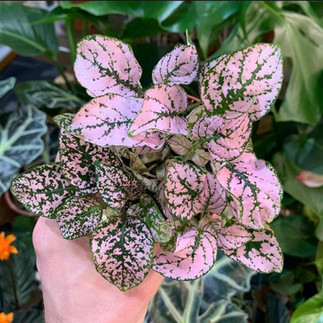How to Look After Hypoestes phyllostachya (Polka Dot Plant) - A Care Guide
- Sam Gaunt
- Mar 11, 2022
- 3 min read
Updated: Mar 12, 2022
Here's some tips on how to care for Hypoestes phyllostachya, so that you can keep your Polka Dot Plant looking vibrant and healthy.

Polka Dot Plant
Hypoestes phyllostachya is a flowering plant species from the Acanthaceae family and is native to South Africa, Madagascar, and South East Asia.
Commonly called the Polka Dot Plant - due to the vibrant spots on its leaves (which often merge to form large patches of colour) - Hypoestes make for a readily available houseplant that will add bursts of alternative colour to a terrarium or plant collection.

Light
Hypoestes phyllostachya prefer bright but indirect light when grown indoors. If your Polka Dot Plant doesn't get enough light, its vibrant colours may begin to disappear, and if it gets too much harsh sunlight (more of a problem when planted outdoors), the Polka Dot's striking colour may fade.

Soil
Your Polka Dot Plant will enjoy a well draining soil that's rich in organic matter. A 1/3 perlite to 2/3 all purpose, organically rich potting mix is a good starting point for a Hypoestes phyllostachya.
Perlite will help aerate the roots and increase drainage so your plant isn't sitting in soaking soil for too long.

Watering
When watering your Hypoestes phyllostachya, the aim should be to keep the soil of your Polka Dot Plant lightly and evenly moist at all times, but not so wet that it's sitting in soaking soil all the time (or this may cause root rot).
Avoid letting your Hypoestes soil dry out completely, if you do, you may notice the foliage starting to wilt, give it a drink to perk it back up.
You'll need to water your houseplant more in the growing season (Spring) and can cut back a little in the colder months.

Humidity
Polka Dot Plants like to live in humid conditions - a humidity level of 50% is good. To help give your Hypoestes a boost, you can mist it regularly or place it on a tray of pebbles and water. Placing your houseplant around other plants will help to create a humid microclimate too.
Due to their love of humidity, Hypoestes make a good plant for terrariums. If your plant is not getting enough humidity the leaves may go brow at the edges or start to curl.

Temperature
Average household temperature will suite your Polka Dot plant just fine - around 15-21°C. However, a few degrees warmer than this should help the plant to grow quicker.
If you're planting your Hypoestes outside, you'll want to bring it indoors when the cold weather and frost comes about.

Toxicity
Hypoestes phyllostachya / Polka Dot Plants are non toxic for pets and humans. However, if your cat or dog ingests a large amount of the plant, it may get a bit sick and vomit.

Growth
Polka Dot plants are prone to growing a bit leggy, so regular pruning will help keep your Hypoestes nice and bushy. Your plant will flower in perfect conditions, but it's really the foliage of this plant that is the main attraction.
Hypoestses like to feed, so aim to give your Polka Dot plant a serving of houseplant fertiliser around once a month in the growing season.
In ideal conditions Hypoestes can grow 1-2 feet tall but are likely to stay smaller when grown indoors. Don't forget to repot your plant and change the soil every
other year or when it becomes root bound.
Hypoestes phyllostachya make great additions to terrariums to add some height and bushy colour too! If you're interested in making a terrarium, we've written a guide on how to start.









Comments